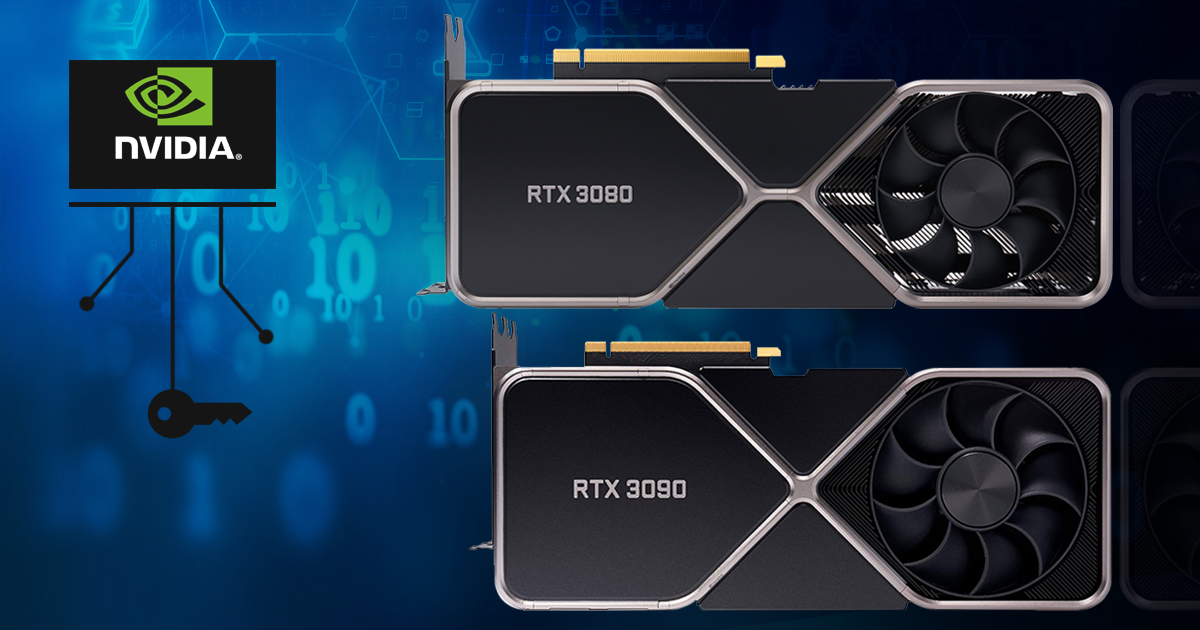
2020-12-17 15:55:15 Author: blog.elcomsoft.com(查看原文) 阅读量:234 收藏
Today we have an important date. Advanced Office Password Recovery turned 16. What started as an instant recovery tool for legacy versions of Microsoft Word had now become a GPU-accelerated toolkit for breaking the many Microsoft formats. Today we’re releasing a major update, giving Advanced Office Password Recovery and Distributed Password Recovery tools the ability to crunch passwords faster with the newest and latest NVIDIA 3000-series graphic boards. Powered by Ampere, the new generation of GPUs delivers unprecedented performance in modern video games. How do the new cards fare when it comes to accelerating the password recovery, and is an upgrade worth it for the forensic experts? Let’s find out.
The 3000 series of GeForce RTX graphics processors are based on the second-generation RTX architecture NVIDIA calls “Ampere”. The new adapters require CUDA 11 to enable access to the powerful RT and Tensor computing units and streaming multiprocessors.
The release of the 3000 series suggests that NVIDIA believes in modern games relying heavily on integer math. With the new architecture, we still have the 64 FP32 cores, but another 64 cores are now designated as “FP32 and INT32”, making half the cores capable of doing either floating-point or integer calculations. Since password recovery relies on integer math, we can effectively utilize half the Ampere cores. You can read a tech article about the new Ampere architecture at Engadget.
What does the new architecture mean for the forensic crowd? Effectively, it’s double the speed compared to the first-generation RTX. Elcomsoft Distributed Password Recovery was updated to support CUDA 11 and the new generation of NVIDIA boards, so we finally a few first-hand benchmarks to share. We also added support for Ampere-based cards to Elcomsoft Advanced Office Recovery, which was released exactly 16 years ago.
First, the Microsoft Office format. Here we try breaking a password to a Word 2019 document.
The NVIDIA GeForce RTX 3090 demonstrated the speed of some 25700 passwords per second; the GeForce RTX 3080 is only slightly behind at 22600 passwords per second, which is around 90% of the speed of the RTX 3090. The first-generation GeForce RTX 2070 is practically half the speed at 12000 passwords per second. Our long-time favorite NVIDIA GeForce GTX 1080 is 8370 passwords per second.
Other formats demonstrate similar results. Attacking a BitLocker volume becomes twice as fast:
The speed of breaking a 7ZIP archive is doubled compared to the 2000-series and nearly tripled compared to the GTX 1080:
Recovering password to an encrypted RAR archive follows the suite. 1x (“single speed”) the 1080, 1.5x on the 2070, and 3x (“triple speed”) for the 3090:
Performance per dollar
So we figured that the NVIDIA GeForce RTX 3090 delivers three times the performance of a GTX 1080 when it comes to breaking passwords, and nearly double the performance of an RTX 2070. Should you fetch the wallet and upgrade your cards? Naturally, it depends on your budget. Let us see how the new cards perform relative to their current prices.
The NVIDIA GeForce GTX 1080 is several years old. The price has fallen to around $749.
First-generation RTX boards such as the RTX 2070 can be bought for about $899.
The RTX 3090 is still new, so expect to pay a premium. Currently listed for $2199. The only slightly slower RTX 3080 is “only” $1199.
And the winner is… NVIDIA GeForce RTX 3080! Its performance blows the old GTX 1080 out of the water, while its price is comparable to the first-generation RTX board, the RTX 2070, with nearly double the performance. The RTX 3090 is about 10 to 13% faster than the RTX 3080 at nearly double the price.
If you cannot afford a 3080, the RTX 2070 is still a decent choice, yet no longer the fastest or even cost-efficient. The long-lasting champion, the GTX 1080, can no longer compete. Even if you can order it (which is becoming more difficult as they are no longer stocked by major retailers), you are likely to pay a premium for an old video card.
Performance per watt
The GTX 1080 TDP is 180W. The RTX 2070 has a board power rating of 215W. The RTX 3080 is rated 320W, and the RTX 3090 is 350W. Here, the RTX 3090 is the most efficient, while the RTX 3080 is only slightly behind. The older boards are consuming more power (and dissipating more heat) to perform calculations.
Our take
The RTX 3080, while not being an absolute speed champion, wins as an overall package. This board offers the best performance per dollar when crunching passwords, and dissipates less heat overall compared to the older cards.
We’d like to thank HOSTKEY B.V. for the test equipment. HOSTKEY offers its clients dedicated and virtual server rental services in TIERIII class data centers in the Netherlands (Serverius), Russia (DataPro) and NY1 (USA).
REFERENCES:
![]()
Advanced Office Password Recovery
GPU-accelerated Advanced Office Password Recovery can use powerful processing units of your ATI and NVIDIA video cards to remove, replace or recover passwords protecting Microsoft Office documents faster. Supporting all versions of Microsoft Office from version 2.0 to 2019, the tool allows specifying a variety of masks and attacks. Its highly-optimized low-level code ensures the quickest recovery of the most complex passwords.
Advanced Office Password Recovery official web page & downloads »
![]()
Elcomsoft Distributed Password Recovery
Build high-performance clusters for breaking passwords faster. Elcomsoft Distributed Password Recovery offers zero-overhead scalability and supports GPU acceleration for faster recovery. Serving forensic experts and government agencies, data recovery services and corporations, Elcomsoft Distributed Password Recovery is here to break the most complex passwords and strong encryption keys within realistic timeframes.
Elcomsoft Distributed Password Recovery official web page & downloads »
如有侵权请联系:admin#unsafe.sh



